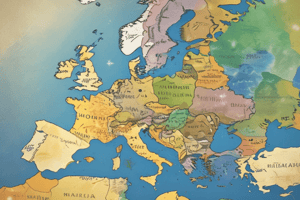Podcast
Questions and Answers
What adopts decisions to further develop and implement policy according to the text?
What adopts decisions to further develop and implement policy according to the text?
- European Commission
- European Council
- European Parliament
- Council of the European Union (correct)
Which body does not participate in the legislative process as per the text?
Which body does not participate in the legislative process as per the text?
- European Parliament
- European Commission
- Council of the European Union
- European Council (correct)
In the context of the CFSP, what reveals the intergovernmental nature?
In the context of the CFSP, what reveals the intergovernmental nature?
- Decisions made by the European Parliament
- Decisions made by the European Commission
- Decisions made by the Council of the European Union (correct)
- Actions undertaken by individual Member States
What is defined by the European Council as per the text?
What is defined by the European Council as per the text?
Who conducts the CFSP through the European Council or Council of the European Union?
Who conducts the CFSP through the European Council or Council of the European Union?
What does the text suggest about the nature of the Common Foreign and Security Policy (CFSP)?
What does the text suggest about the nature of the Common Foreign and Security Policy (CFSP)?
What is a major limitation of the CFSP?
What is a major limitation of the CFSP?
How does the text describe the Common Foreign and Security Policy in comparison to other peacekeeping International Organizations (IOs)?
How does the text describe the Common Foreign and Security Policy in comparison to other peacekeeping International Organizations (IOs)?
What does the Treaty on European Union (TEU) imply regarding the binding effect of the CFSP?
What does the Treaty on European Union (TEU) imply regarding the binding effect of the CFSP?
Which statement best describes the role of member-states within the Common Foreign and Security Policy (CFSP)?
Which statement best describes the role of member-states within the Common Foreign and Security Policy (CFSP)?
What does the text suggest about the formulation and conduct of foreign policy within the EU?
What does the text suggest about the formulation and conduct of foreign policy within the EU?
Why does the text mention that EU policies are sometimes problematic?
Why does the text mention that EU policies are sometimes problematic?
'Art. 24(3) TEU imposes respect for and participation upon member-states in the CFSP' - what is implied if these conditions are not met?
'Art. 24(3) TEU imposes respect for and participation upon member-states in the CFSP' - what is implied if these conditions are not met?
'Not all areas of foreign policy are covered by the CFSP: member-states’ territorial defense is an example' - What does this imply about CFSP?
'Not all areas of foreign policy are covered by the CFSP: member-states’ territorial defense is an example' - What does this imply about CFSP?
Flashcards are hidden until you start studying
Study Notes
Decision-Making and Legislative Process
- Decisions regarding the development and implementation of policy are adopted by the European Council.
- The European Parliament does not participate in the legislative process of the Common Foreign and Security Policy (CFSP).
Intergovernmental Nature of CFSP
- The CFSP reveals its intergovernmental nature through its decision-making process, which involves member states rather than EU institutions acting autonomously.
Definition by the European Council
- The European Council defines the overall direction and priorities of the Union's foreign and security policy.
Conduct of CFSP
- The CFSP is conducted by the European Council or the Council of the European Union, ensuring that member states remain central to strategic decision-making.
Nature of CFSP
- The CFSP is primarily intergovernmental, relying on consensus among member states rather than a supranational framework.
Major Limitation of CFSP
- A significant limitation of the CFSP is its reliance on unanimous agreement, which can hinder timely and decisive action.
CFSP Compared to Other International Organizations
- The CFSP is described as less robust than other international peacekeeping organizations, which may operate under more cohesive command structures.
Binding Effect of TEU
- The Treaty on European Union (TEU) suggests that while the CFSP has implications for member states, its binding effect can be weaker compared to other policies.
Role of Member-States in CFSP
- Member states play a crucial role in shaping and implementing the CFSP, emphasizing national interests over collective EU strategies.
Foreign Policy Formulation in the EU
- The formulation and conduct of foreign policy within the EU are often complex and can lead to inconsistencies due to diverse national interests.
Problematic EU Policies
- Occasionally, EU policies face challenges due to the different priorities of member states, creating potential conflicts and inefficiencies.
Conditions of Article 24(3) TEU
- If the conditions of respect and participation imposed by Article 24(3) TEU are not met, it could undermine the legitimacy and effectiveness of the CFSP.
Areas Excluded from CFSP
- Not all foreign policy areas fall under the CFSP; for example, member states retain control over their territorial defense, highlighting the limited scope of the CFSP.
Studying That Suits You
Use AI to generate personalized quizzes and flashcards to suit your learning preferences.





